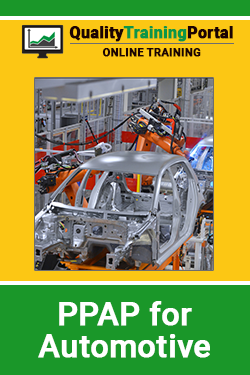Course Information
PPAP for Automotive
Learners will be able to:
- Explain PPAP documentation requirements.
- Complete PPAP documents for automotive customers.
- Use PPAPs to build and maintain supplier-customer trust.

About This Course
PPAP stands for Production Part Approval Process. It was developed by AIAG (the Automotive Industry Action Group) and it is an important part of their comprehensive Advanced Product Quality Planning (APQP) approach. APQP was originated to provide a common, standardized process for planning, developing and communicating the requirements and status of new products and services between suppliers and their customers. There are five phases to APQP; PPAP is triggered in Phase 4, Product & Process Validation.
On the surface, PPAP can appear to be complicated and even overwhelming. Once it is understood, it becomes apparent that PPAP requirements represent the culmination and reporting of activities that any “good” supplier already does. The PPAP Process merely helps put the reporting of activities and their results into a structured and consistent format.
This PPAP Training online course teaches learners what PPAP’s are, why they are important and how to conduct a PPAP by fulfilling all 18 elements of the PPAP Package. This course is specifically focused on PPAPs for the automotive industry. We also have a PPAP course specifically for the aerospace industry.
- Fundamentals of APQP – To have an in-depth understanding of the overall APQP process and how PPAP fits into that process.
- English (EN-US)
- Chinese (simplified) (ZH)
- Czech (CS)
- French (FR)
- German (DE)
- Italian (IT)
- Japanese (no audio) (JA)
- Korean (no audio) (KO)
- Polish (PL)
- Portuguese (Brazilian) (PT-BR)
- Romanian RO)
- Russian (RU)
- Spanish (ES)
- Vietnamese (no audio) (VI)
Course Objectives
- Understand what PPAP is, why it should be used and when it should be used.
- Know how to complete PPAP documentation requirements for the automotive industry.
- Interpret when specific PPAP requirements apply and when they don’t.
Course Outline
Lesson 1 | PPAP Overview
- Explains what the PPAP Process is.
- Explores why a PPAP should be used.
- Discusses when PPAP is needed.
- Introduces how the PPAP Process is conducted.
Lesson 2 | Documentation Requirements
- Explores each of the 18 Elements of the PPAP Automotive Documentation Package.
- Explains “Reasons for PPAP Submission.”
- Describes PPAP “Submission Levels.”
Lesson 3 | Reviewing the PPAP Process
- Clarifies PPAP requirements.
- Reinforces how the PPAP Process fosters customer-supplier trust.
- Confirms that PPAP documentation is based on data.
- Reviews documentation requirements for Bulk Materials.
- Discusses customer-supplier negotiations.
- Recaps requirements for part submission, retaining documentation, Master Samples and shipment samples.
Challenge
- An assessment of the learner’s progress in this course.

4.7 out of 5 stars
Comments from Learners About This Course
- Very good summary of the main concepts of PPAP and PSW.
- A great overview that reinforces some of the details that we don’t use every day. The reference guide will be a handy resource for future work and discussions with customers.
- It’s what you need to know for PPAP!
- Well done. Good explanations and I like the check answer sections to get back immediate feedback.
- Well structured course content with simple to follow instructions. The extra information provided by the notes (hover over buttons) is good.
You may also be interested in…
- FMEA Training – Complete online training in how to conduct Design and Process FMEAs and to reduce high Risk Priority Numbers, how to customize FMEAs for a specific business and how to maintain improved processes using a control plan.
- Advanced SPC Training – Comprehensive training in how to implement statistical process control including setting up control charts and conducting process capability studies.




